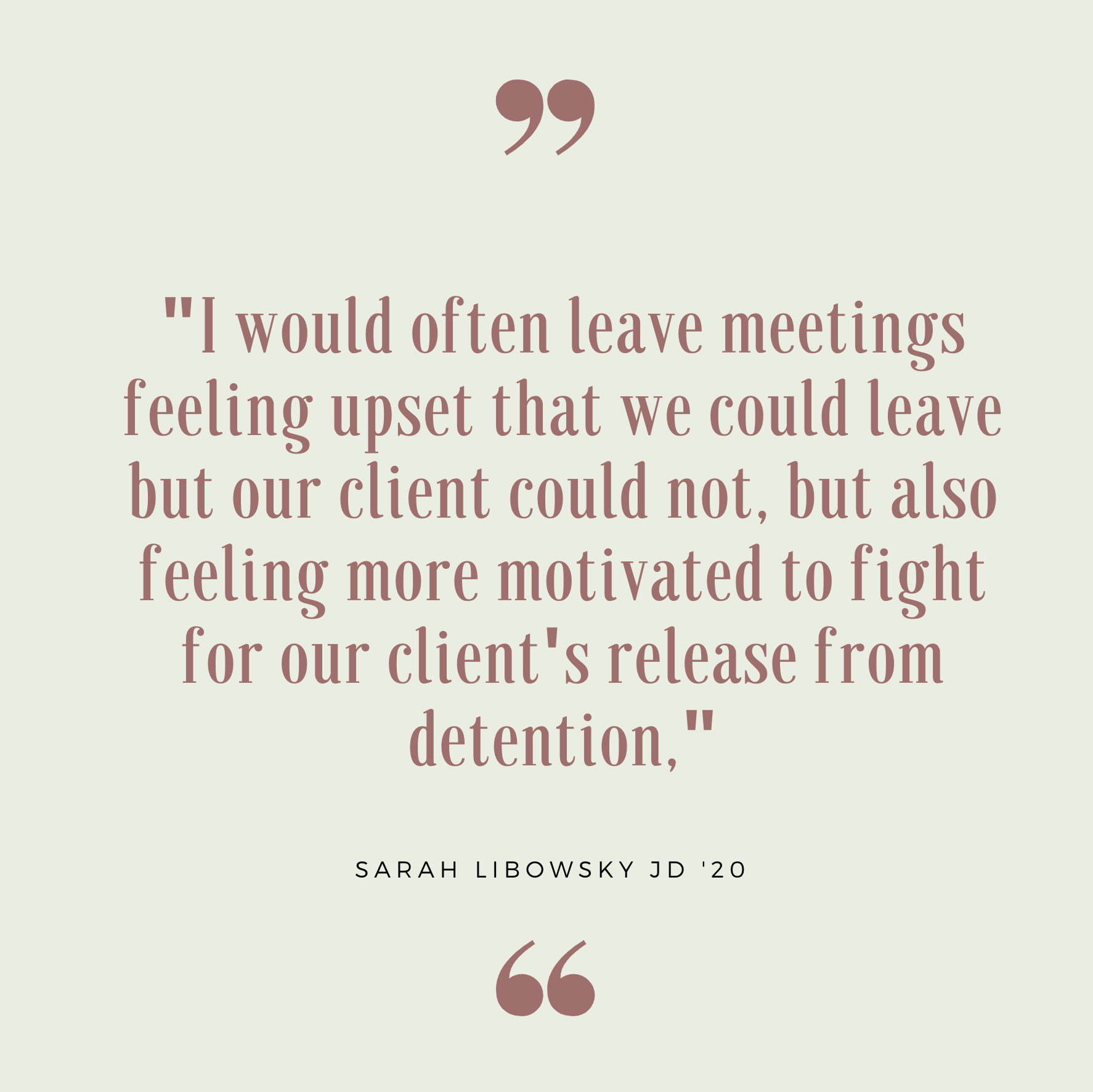via HIRC blog

Though Massachusetts is far from the Southern border, many immigrants are still detained across the state. Until recently, one of those detainees was John*, a man who was tortured in his home country in East Africa. John ended up in detention because certain criminal convictions triggered the deportation process and eventually led his case to the Clinic. HIRC students Michael Hur ’20, Sarah Libowsky ’20, and Eun Sung Yang ’20 were assigned to the case, working under the supervision of HIRC’s Director Sabi Ardalan and Clinical Instructor Cindy Zapata.
John’s clinical team began by meeting with Crimmigration Clinic students Niku Jafarnia ’20 and Krista Oehlke ’20, who used their knowledge of the criminal and immigration systems to determine what immigration protections John would be eligible for. Because of the nature of some of John’s convictions, he was barred from asylum and withholding of removal. Ultimately, John’s legal team concluded that his best option would be to pursue deferral of removal under the Convention Against Torture (CAT).
Having determined what relief was available to John, Michael and Eun Sung began to build a case. However, because John was detained, they were unable to communicate by phone, which meant three-hour round trip drives to visit their client in person at the Plymouth County Correctional Facility in Plymouth, Massachusetts.
Not only did working with a detained client mean long days of travel, but detention also created additional challenges to representation. Like many clients who come to HIRC, John had faced persecution and violence in his home country. He was detained and tortured as a young child and suffered from severe trauma as a result of these experiences. This lasting trauma often made discussions necessary to build his case very difficult to navigate.
“Although a necessary part of preparing his case, recounting his childhood experiences to us in detail retriggered his trauma, which caused him to lose his appetite and to develop insomnia,” Michael explained. HIRC clinical social worker Liala Buoniconti traveled with the team to the detention center to help provide support, but John, like many detained individuals, was still unable to access the medical and mental health services he so desperately needed.
“There were times when his trauma symptoms compromised his ability to remember key details, to recount his story, and to process and understand fully what we were explaining to him,” Michael added. This was particularly difficult because, in order to be granted deferral of removal under CAT, the students had to prove that it would be more than likely than not (greater than 50%) that John would be tortured if returned to his home country. By comparison, asylum-seekers need to demonstrate only a 10% likelihood of persecution.
Yet despite facing these numerous obstacles, the students continued to work to build the best possible case for John. “I would often leave meetings feeling upset that we could leave Plymouth but our client could not, but also feeling more motivated to fight for our client’s release from detention,” said Sarah. After numerous meetings with John and many hours spent compiling supporting documents and expert testimony, the students submitted an over-700 page filing. Two weeks later, John and his legal team arrived at the Boston Immigration Court for his merits hearing. Both Eun Sung and Michael described the hearing as a highlight of their experience working on the case.
“The hearing provided a great opportunity to see our client share his story so powerfully in court and to observe (alongside a multitude of students, attorneys, and volunteers who had worked on the case) how the semester’s work could support him and help shape the hearing,” Eun Sung said. Both John and his supporters were overjoyed when the judge granted John deferral of removal. After so many hours of hard work and preparation, their client was now finally going to be released from detention.
“There were several nights when I had trouble sleeping because I was worried about our client getting deported, which very likely meant torture or even death,” Michael recalled. “When the judge finally gave us her oral decision, my immediate reaction was to clutch the client’s hand and smile.”
Detention is a painful and dehumanizing experience for many of our clients, especially for those like John who have mental health needs that are rarely met in detention facilities. We are relieved that John can now begin to access the support he needs to build a secure life in the United States.
*Name has been changed to respect client confidentiality.
Thanks to HIRC staff Sabi Ardalan, Liala Buoniconti, Phil Torrey, and Cindy Zapata for their supervision of this case. Thanks also to HIRC & Crimmigration clinical students Michael Hur ’20, Niku Jafarnia ’20, Sarah Libowsky ’20, Krista Oehlke ’20, and Eun Sung Yang ’20 for their hard work.
Filed in: Clinical Spotlight
Tags: Cindy Zapata, Eun Sung Yang, Harvard Immigration and Refugee Clinical Program, HIRC, Michael Hur, Sabi Ardalan, Sarah Libowsky
Contact Office of Clinical and Pro Bono Programs
Website:
hls.harvard.edu/clinics
Email:
clinical@law.harvard.edu